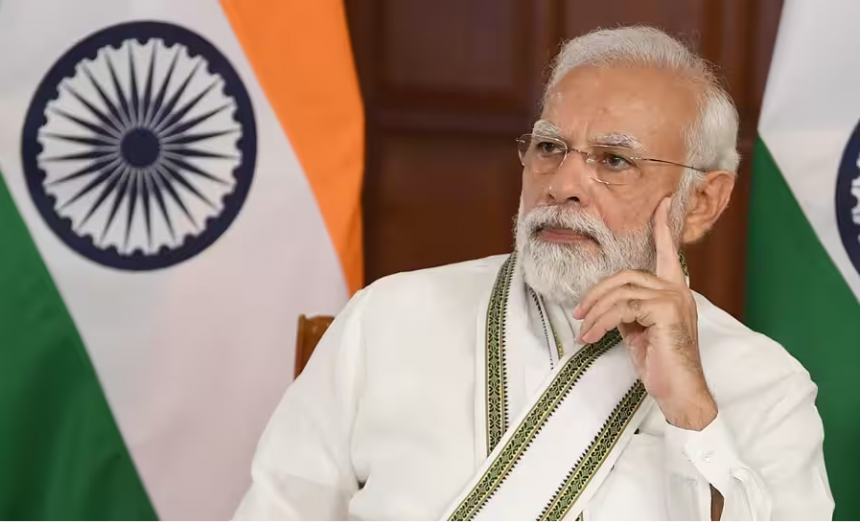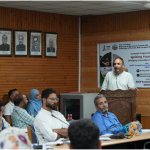RESEARCH EXCELLENCE
It was the 74th Independence Day on August 15, 2020, when Prime Minister Narendra Modi, from the ramparts of the Red Fort, introduced an initiative to establish the National Research Foundation (NRF). This was part of his broader vision for India’s development, with the NRF intended to boost scientific research and innovation across the country. The origins of the NRF can be traced back to the growing recognition that India’s higher education institutions and research output, though significant, lag behind global standards. The need for a coordinated body to support and manage research funding became evident as India aspired to boost its global standing in science and technology.
The Union Cabinet, chaired by the Prime Minister Shri Narendra Modi, approved the introduction of the National Research Foundation (NRF) Bill, 2023 in the Parliament on 28th June. The approved Bill paved the way to establish NRF that will seed, grow and promote Research and Development (R&D) and promote a culture of research and innovation throughout India’s universities, colleges, research institutions, and R&D laboratories. The bill outlined the establishment of the NRF under the Department of Science and Technology (DST) and proposed a five-year budget of Rs. 50,000 crore to support research activities across various fields.
This allocation of resources demonstrated the government’s commitment to promote a culture of research in India and provide researchers and institutions with the financial backing they needed to pursue cutting-edge projects. The NRF Act, passed in August 2023, established the foundation as the apex body for research in India. With the Prime Minister of India serving as its President, the NRF enjoys the highest level of leadership and oversight. A Governing Board, comprising prominent scientists, researchers, and industry leaders, was set up to guide the foundation’s activities, review projects, and allocate funding.
The key aim of Anusandhan National research foundation is to provide high-level strategic directions for research, innovation, and entrepreneurship in the fields of natural sciences, including mathematical sciences, engineering and technology, environmental and earth sciences, health and agriculture, and scientific and technological interfaces of humanities and social sciences. In the past, Indian research efforts have often been siloed, with limited interaction between academia and the private sector. The NRF seeks to promote an environment where research and innovation can thrive.
Collaboration between institutions will also ensure that research projects have practical applications that benefit society at large. The NRF is designed to be inclusive. It aims to support research across Tier 2 and Tier 3 institutions, which often struggle to access funding and resources. This decentralized approach ensures that researchers in smaller universities and colleges are given equal opportunities to contribute to national projects. The NRF is to enhance research infrastructure in India. This includes providing funding for laboratories, research equipment, and state-of-the-art facilities that can support high-quality research. Many Indian institutions have faced challenges due to outdated infrastructure, limiting their ability to conduct world-class research.
India has a rich history of scientific achievements, from ancient contributions to mathematics and astronomy to modern advancements in space exploration and information technology. The NRF seeks to build on this legacy by providing a structured and well-funded platform for researchers. The foundation will help attract the best minds to research careers, offering them the support and resources they need to pursue innovative projects. The foundation aims to build a strong pipeline of researchers, innovators, and scientists. This includes providing mentorship and guidance to young researchers, as well as offering funding for scholarships and research fellowships.
The Anusandhan National Research Foundation (ANRF) represents India’s efforts to advance research and innovation to reach global standards in science and technology. Its key objectives include creating a roadmap for research that focuses on the short, medium, and long term. The foundation supports academic and research institutions, particularly universities and colleges that are still developing their research capacities. It achieves this through funding, fellowships, research projects, and creating centers of excellence. ANRF also aims to support and fund research proposals that undergo a competitive peer-review process. It helps institutions build research infrastructure with a focus on national priorities, strategic areas, and emerging technologies. One of its goals is to increase India’s presence in important global research areas and to assist in converting research into large-scale technologies.
The foundation coordinates national programs to address social, financial, and technological challenges. It works with the government, industry, and other institutions to track research spending and results and report these to the government. Additionally, ANRF promotes international collaborations and the exchange of scientific knowledge. It encourages partnerships with Indian and foreign scientists and promotes investments from public and private sectors to strengthen India’s scientific ecosystem. It also maintains a national survey to track the progress and outcomes of research.
The schemes introduced by the Science and Engineering Research Board (SERB) include Intensification of Research in High Priority Areas (IRHPA), Core Research Grant, Start-up Research Grant (SRG), Scientific and Useful Profound Research Advancement (SUPRA), Empowerment and Equity Opportunities for Excellence in Science, Mathematical Research Impact Centric Support (MATRICS), Impacting Research Innovation and Technology (IMPRINT-2), International Travel Support, Seminar and Symposia, Short-term special call on COVID-19, SERB-POWER Grant, State University Research Excellence (SERB-SURE) and Fund for Industrial Research Management (SERB-FIRE).
The awards and fellowships offered by the Science and Engineering Research Board (SERB) include the National Post Doctoral Fellowship, J.C. Bose Fellowship, Ramanujan Fellowship, Teachers Association for Research Excellence (TARE), Visiting Advanced Joint Research Faculty (VAJRA), Overseas Visiting Doctoral Fellowship (OVDF), SERB Science and Technology Award for Research (SERB-STAR), SERB Women Excellence Research Grant, SERB-POWER Fellowship, SERB-POWER Translation, SERB-POWER Mobility, SERB Technology Translation Award (SERB-TETRA), National Science Chair and SERB International Research Experience (SIRE).
The establishment of ANRF in India is made possible primarily due to the vision and leadership of Prime Minister Narendra Modi. He has consistently demonstrated a strong commitment to advance research and innovation in India. Since taking office, he has recognized the vital role that scientific research plays in the country’s development. His vision for a robust research ecosystem is evident in initiatives like the National Research Foundation (NRF), which aims to strengthen India’s scientific capabilities and ensure that researchers have the support they need to excel.
Under Modi’s leadership, numerous programs and fellowships have been introduced to empower researchers and promote excellence in science. Moreover, Modi’s emphasis on collaboration between academia and industry has promoted an environment conducive to innovation. Programs like the SERB Technology Translation Award exemplify this focus, as they incentivize researchers to bring their ideas to market. Initiatives such as the SERB-POWER Fellowship and the SERB Women Excellence Research Grant aim to empower women and underrepresented groups in research.
Prime Minister Narendra Modi’s vision for India’s research and innovation is transforming the country into a global scientific powerhouse. The focus on strengthening research institutions, fostering collaboration, and promoting diversity is paving the way for a brighter future. India is taking significant steps toward achieving excellence in science and technology, inspiring countless to pursue their passion for research.
(Author is Professor & Chairman, Centre for Narendra Modi Studies (CNMS-NaMo Kendra. Email: [email protected]; www.namostudies.com)








